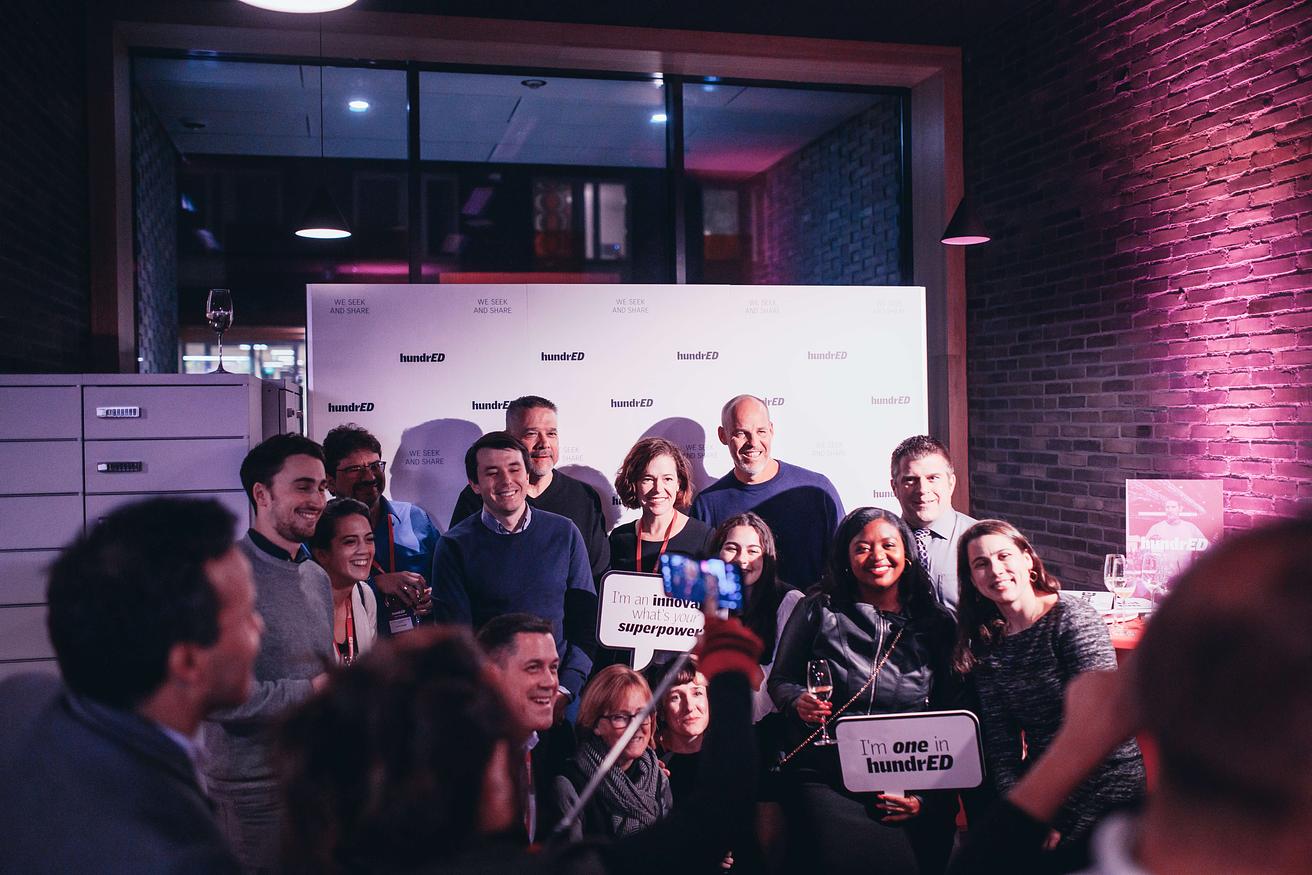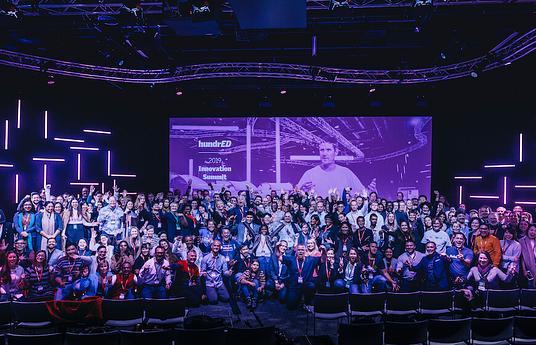A delegation of 18 people from Pittsburgh, Pennsylvania, USA attended this year’s HundrED Innovation Summit as a result of HundrED’s Spotlight on Pittsburgh.
It was affirming and inspirational to come together with HundrED's international community of innovators, and we learned so much from the people we met, the places we visited, and the Summit activities. Over the past few days, I’ve chatted with the Pittsburghers who attended the Summit, and I’m pleased to share some of the things we learned on our trip to Helsinki.

1. Putting students at the center is not just possible, it is necessary: it will revolutionize our education system.
Youth voice and power was a central theme of the Summit, and it was also very present in the minds of Pittsburghers as we reflected on our time in Helsinki. Chanessa Schuler and Larry Berger (from SLB Radio Productions, the home of Youth Express) interviewed Helsinki Youth Council members and HundrED Youth Ambassadors ahead of the Summit, and Larry told me that, “their insights with respect to education, the environment, equity, and their future were remarkable. While recognizing the challenges at hand, all also had a sense of optimism and hope.”
Several people from Pittsburgh told me that they were energized and inspired by the young Summit attendees who are leading change. Kelly Rottmund (Teen Services Coordinator at the Carnegie Library of Pittsburgh, which operates The Labs Summer Skills Intensives) reflected: “I continue to believe young people are the best thing about our city and that they have the answers.”
2. Remaking learning may require some new definitions.
The Summit included a wide diversity of perspectives, and Maureen Frew (Teacher at Avonworth Primary Center, and co-founder of JAM) shared with me that, “The word ‘school’ means many different things all over the world, it's amazing to see how it's interpreted all over the world.”
Many of us were inspired by Agora, a school in the Netherlands that is radically rethinking the idea of school: it has no classes, no classrooms, and no curriculum. Several Pittsburgers are interested in how the intrinsic motivation and mastery-based learning principles that underpin this model could be used to establish a more student-centered culture in our schools here.

3. We are far more alike than we are different.
Dana Winters shared with me that she was “constantly struck by Fred Rogers’s words that ‘We are far more alike than we are different.’ There were people there from every continent—representing a myriad of programs and initiatives aimed at supporting children. When talking with people, it was comforting and hopeful to hear that we face similar challenges (funding, political systems, structural injustice, etc.) but that these challenges are not stopping any of us from doing what we believe will truly help. We are alike in our goals, and speak a common language of helping and service.”
Tyler Samstag (Director of Instructional Innovation at the Allegheny Intermediate Unit, home of transformED) made a similar observation based on what young people from across the world shared at the Youth Leadership Panel during Helsinki Education Week: “Despite radically different political, economical, and pedagogical contexts of each country, there was a common theme in what all of the students wanted out of their schooling: an opportunity to engage in cross-disciplinary project-based learning that would allow them apply content to solve real-world problems.”
4. Accessible public transportation makes the entire city your classroom.
Students and teachers in Helsinki can take public transportation for free during school hours, and schools take advantage of this to get students engaged in the world around them on a regular basis. Scott Miller (Principal at Avonworth Primary Center, where JAM was born) told me, “They are not once a year field trips, but weekly visits to places to engage in the learning process and make learning visible to the community. With Pittsburgh's history and resources, this is a concept I look forward to implementing with our students.”
And how about making your classroom into an entire city? We were also inspired by Me & MyCity, a Finnish program that teaches students about financial literacy by putting them in charge of their own miniature city.
5. We shouldn’t accept nonsense just because it’s normal.
Sunanna Chand (Director of Remake Learning) told me that the international setting helped shift her perspective. “I remember explaining to someone from Denmark how the United States education system is funded (based on property taxes, which leads to vast inequities in our system), and he exclaimed, ‘The world turned upside down!’ To us, while nonsensical, it's normal. To him, it was shocking. It was an incredible reminder to not accept the nonsense just because it is normal to us.”
Chanessa Schuler noticed another mindset shift: “One thing I learned in Helsinki is that educators around the world are doing their best to think from an asset perspective, rather than a deficit perspective. Educators want to do more of what is working for our students, and less of what is not. This is important as we continue to provide safe, high quality and innovative learning experiences and spaces for our youth in all corners of the world. If we want to change the mindsets of our students, we must change our own mindsets.”
6. We should be striving to have the best worst schools.
Finland is internationally known for having excellent schools. Being there made it clear to us that having an excellent education system means ensuring that each and every school meets a high minimum standard. At the 2020 Global Collection launch, Helsinki Mayor Jan Vapaavuori told the crowd, “I’m not sure whether Helsinki has the best schools in the world. But I am sure that we have the best worst schools in the world.”
Tom Lauwers (founder of BirdBrain Technologies, the robotics company behind the Finch Robot) spoke to Marjo Kyllönen who works for the Helsinki Education Division, who told shared two of the ingredients to Helsinki’s “best worst” schools: policies that effectively ban private schools, and very high quality teaching—the university teaching programs in Finland are more selective than the pre-med programs! It was clear in Helsinki that educators are considered some of society’s greatest resources.

7. Sometimes it takes distance to see the amazing things in your own backyard.
Everyone from the Pittsburgh delegation lives and works within a 50 mile radius, and yet there were still things for us to learn from each other while we were together half-way around the world! Several Pittsburghers told me that a highlight of the entire Summit was the keynote from Peyton Klein, founder of Global Minds (you can watch it yourself, right here, starting at 00:09:55). Chip Lindsey (Director of Education at the Children’s Museum of Pittsburgh, home of MAKESHOP) told me, “I had to travel to Finland to discover the incredible depth of expertise quietly changing the world right here in Pittsburgh! I felt like Dorothy, returning to Kansas from Oz.”
Of course, many of the Pittsburgh delegates were already deeply connected prior to departing for the Summit, and the deepening connections we experienced in Finland were a great reminder of the importance of the intentional network building that Remake Learning does.
8. Change is possible, and we must maintain a long-term vision to realize what we want to see.
The Summit was undeniably inspiring, from LEGO Foundation VP Sarah Bouchie’s story of changing the temperature by a single degree (watch it starting at 00:24:32 here) to the youth-driven Green School Bio Bus, which simultaneously addresses transportation and waste problems. We left feeling that change is possible, and that it’s our responsibility to maintain a vision for the education system we want to see.
“One thing that I will be taking back to my team is the need to redefine our work,” Melanie Claxton (Coordinator for Out-of-School Time for Pittsburgh Public Schools, which is the home of Summer Dreamers Academy) told me. “If I want Summer Dreamers to exist in 10 years, it can't have the same purpose. If it does, then we have not our accomplished our mission. We must move past a program designed to address an immediate need (under-performance during the school year) to a program that is the district's approach to creating a holistic, year-round learning experience for all students regardless of performance.”


